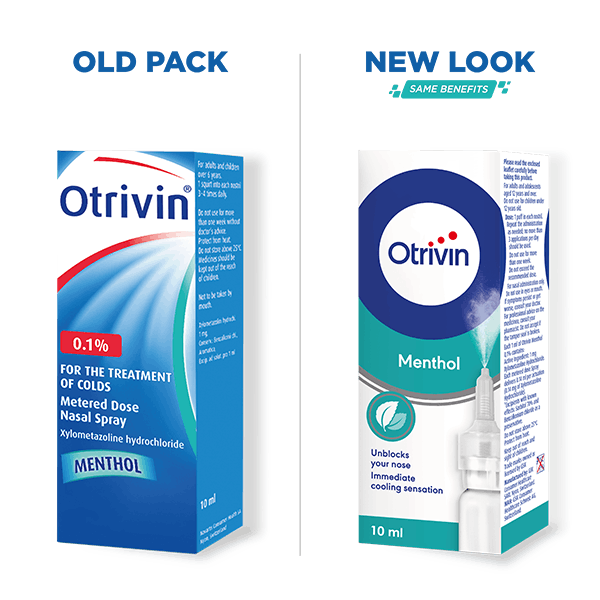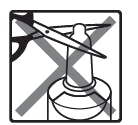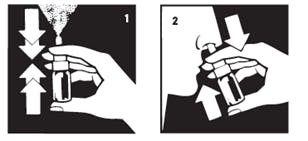When to use
Otrivin Menthol 0.1%is used for various types of colds. It is designed to be applied in the nostrils, where it exerts a vasoconstricting effect thereby decongesting the mucosae of the nose and the throat. This effect allows patients with colds to breathe more easily through the nose. Otrivin Menthol 0.1% facilitates the flow of secretions in inflammation of the sinuses.
In otitis media, as an aid for decongesting the nasopharyngeal mucosa.
To facilitate rhinoscopy.
Otrivin Menthol 0.1% spray not to be used in children below 12 years old. For adults and children aged 12 years old and over. Used to relief from nasal congestion associated with sinusitis.
Precautions
Talk to your doctor or pharmacist before using Otrivin Menthol 0.1% if:
· You have high blood pressure.
· You suffer from a heart disease. Patients with a long QT syndrome have an increased risk of sever ventricular arrhythmia when undergoing treatment with xylometazoline.
· You have an overactive thyroid gland (hyperthyroidism).
· You suffer from diabetes.
· You have an enlarged prostate gland (prostatic hypertrophy).
· You have a benign tumour of the adrenal gland that produces high amounts of adrenaline and noradrenaline (phaeochromocytoma).
· You are being treated with some antidepressants known as monoamine oxidase inhibitors (MAOIs) or if you have used them within the previous 2 weeks.
If any of the above apply, do not use Otrivin Menthol 0.1% before talking to your doctor or pharmacist.
· Like other products for the relief of blocked nose, Otrivin Menthol 0.1% may give rise to sleep disturbances, dizziness, tremor in very sensitive patients. Consult your doctor if such signs prove troublesome.
· Like other nasal decongestants, Otrivin Menthol 0.1% should not be used for more than 7 consecutive days. If symptoms persist, consult your doctor. Prolonged or excessive use may cause stuffiness in the nose to return or worsen.
· Otrivin Menthol 0.1% is not intended for use in the eyes or mouth.
· Do not exceed the recommended dosage, especially in children and in the elderly.
· Otrivin Menthol 0.1% should not be used for children below 12 years of age.
Further information
Tell your doctor or pharmacist if you are taking, have recently taken or might take any other medicines. In particular, you should not use Otrivin Menthol 0.1% if you are taking:
* Certain medicines used for treatment of depression. These medicines are:
· Monoamine oxidase inhibitors (MAOI): do NOT use Otrivin Menthol 0.1% if you are taking or have been taking MAOIs within the last 14 days.
· Tri-cyclic and tetra-cyclic antidepressants.
· You suffer from diabetes.
* Potentially hypertensive medicines or medicines for Parkinson’s disease (levodopa).
If you use any of the above medicines, consult a doctor before using Otrivin Menthol 0.1%.
Like all medicines, Otrivin Menthol 0.1% can cause side effects, although not everybody gets them.
STOP using Otrivin Menthol 0.1% and seek medical help immediately if you have any of the following which may be signs of an allergic reaction:
· Difficulty breathing or swallowing.
· Swelling of the face, lips, tongue or throat.
· Severe itching of the skin, with a red rash or raised bumps.
· Irregular Heartbeat.
Common side effects (may affect up to 1 in 10 people):
Dryness or irritation of the nasal mucosa, rhinitis medicamentosa, nausea, headache, local burning sensation. May cause stomach upset and diarrhea.
Very rare side effects (may affect less than 1 in every 10,000 people):
Allergic reactions (skin rash, itching), blurred vision, irregular or fast heartbeat, hypertension.
If any of the side effects gets serious or if you notice.
Otrivin Menthol 0.1%should not be used during pregnancy.
The use of Otrivin Menthol 0.1% while breast-feeding should only take place on the instructions of a doctor.
Otrivin Menthol is available in 10 ml packs. Keep out of reach of children. Do not use after the expiry date stated on the bottle.
Always read the patient information leaflet.









